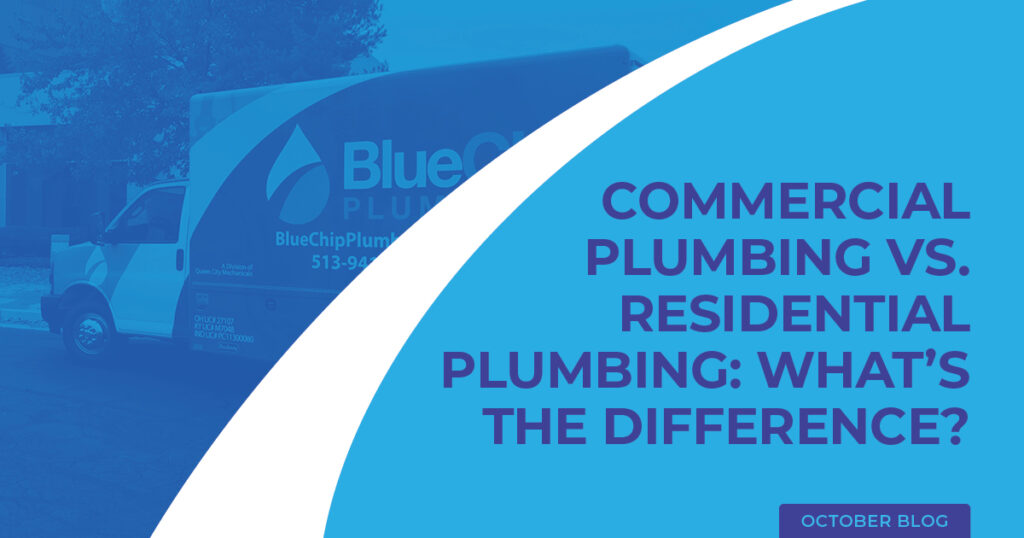
While many people assume that the differences between residential and commercial plumbing are huge, much of it really comes down to scale. Residential plumbing includes sinks, toilets, appliances, drains, pipes, and water systems for a home, but commercial plumbing expands on those basics with larger and more complex systems.
Similarities & Differences of Commercial Plumbing and Residential Plumbing
Size. One of the biggest differences is size. Residential plumbing systems serve fewer people and are generally smaller and less complex. Commercial plumbing, on the other hand, is built for larger buildings with many more users, both tenants and visitors. Because of this, the systems are larger, sturdier, and designed to handle much heavier use.
Usage. How the systems are used also sets them apart. A home typically averages about 88 gallons of water per day. Commercial spaces use far more, especially during the workday when activity is at its peak. Residential plumbing, meanwhile, tends to see heavier use in the evenings and on weekends.
Complexity. Commercial and residential plumbing also differ in the complexity of their systems. Residential plumbing is normally limited to 1-2 floors and has more straightforward plumbing setups with toilets, sinks, and showers. Commercial systems can span multiple floors and include additional fixtures like urinals, water fountains, and more.
Equipment and Materials. Because residential and commercial plumbing systems operate on different scales, the equipment and fixtures they rely on aren’t quite the same. In commercial spaces, you’ll often find high-flow toilets, large water heaters, boilers, or booster pumps built to handle heavy use. Tackling these systems also calls for specialized tools that can keep up with the complexity of the job.
Scheduling and Access. Plumbing work in homes and businesses also happens on different schedules. For residential jobs, plumbers usually work during the day with some flexibility for emergencies or a homeowner’s availability. Fixtures in homes are easy to reach, which helps projects wrap up faster. Commercial plumbing, however, is a different story. Repairs and installations could be scheduled after hours to avoid disrupting business, and reaching the systems themselves can be more challenging. That added complexity often means projects take a little longer.
Regulations. Residential and commercial plumbing are each governed by a different set of regulations. While residential plumbing follows standard safety codes, commercial plumbing must meet regulations regarding safety, public health, accessibility, and the environment. Experienced commercial plumbers are well-versed in these regulations and can be a valuable partner in keeping buildings safe and compliant.
In other words, a commercial space isn’t just a bigger house. Because of the differences in the systems used in homes and commercial spaces, the plumbing needs are different, and so are the services needed to keep everything running smoothly.
Common plumbing services for homes include problems such as:
Common plumbing services for commercial spaces include problems such as:
At Blue Chip Plumbing, we’ve seen it all. We understand the different challenges that both residential and commercial plumbing can bring, and we’re ready to help you address your plumbing challenges to keep your business running smoothly. Contact us here or give us a call at (513) 999-6820 for your commercial or residential needs.
Question & Answers
What is the main difference between commercial and residential plumbing?
Answer: The biggest difference is scale. Residential plumbing serves individual homes with simpler systems, while commercial plumbing supports larger buildings with more complex, high-capacity systems designed for heavy use.
How does water usage differ between residential and commercial plumbing?
Answer: Residential plumbing typically uses around 88 gallons of water per day per household, with peak usage in the evenings and weekends. Commercial plumbing sees much higher usage during business hours due to more people using the facilities.
Why is commercial plumbing more complex than residential plumbing?
Answer: Commercial systems often span multiple floors and include additional fixtures like urinals and water fountains. They require specialized equipment and tools to manage the increased complexity and volume.
Are plumbing regulations different for commercial and residential buildings?
Answer: Yes. Residential plumbing follows standard safety codes, while commercial plumbing must meet stricter regulations related to public health, accessibility, and environmental standards.
What types of services are typically needed for commercial plumbing vs. residential plumbing?
Answer: Residential services often include fixing clogs, leaks, and water heaters. Commercial services involve repairing sewer and gas lines, maintaining large boiler systems, and cleaning grease traps and complex drain systems.

Sign up for deals and exclusive offers.
1950 Waycross Road
Cincinnati, OH 45240
Follow us

Sign up for deals and exclusive offers.
1950 Waycross Road Cincinnati, OH 45240
Copyright 2025 Blue Chip Plumbing
Follow us

Sign up for deals and exclusive offers.
1950 Waycross Road Cincinnati, OH 45240
Copyright 2025 Blue Chip Plumbing
Follow us
Get the help you need fast!
Choose from the following options